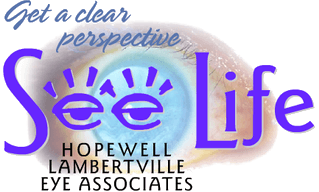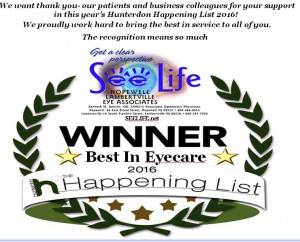Optometric Physicians of Hopewell and Lambertville
An optometrist is a Doctor of Optometry (O.D.) or Optometric Physician such as Drs. Ken Daniels, Mimi Lee –Parma and Priyam Patel are licensed physicians trained to conduct extensive eye exams, prescribe corrective contact lenses and glasses, and most importantly, diagnose and treat eye disease and disorders and determine if there are any systemic relationships that might be effecting the well-being of the individual. If treatment is required, the physicians at Hopewell – Lambertville Eye will address the concern with respect to the patient’s own philosophy of medical care, from the use of naturaceuticals to the best technology and quality of medications available to treat ophthalmic disease.
The Optometric Physician utilizes the best technologies and techniques to determine and treat ocular conditions by not only prescribing corrective eyewear (eyeglasses or contact lenses), but will develop initiatives to treat various conditions with low vision devices, vision therapy, corneal reshaping, laser vision correction.
Most importantly, if there is medically related concern of the eye, the doctors of Hopewell – Lambertville Eye will treat the medical conditions of the eye via topical and systemic medications. If, in cases, surgery becomes the requirement, the Optometric Physicians at Hopewell – Lambertville Eye have a large associate network of Ophthalmic Surgeons at Wills – Princeton Eye Group, The Retina Vitreous Center, Wills Eye Hospital, Delaware Valley Retina to call upon for the required services.
For our patient’s convenience and expedient care, our offices has Princeton Eye Group surgeons (ophthalmologist (M.D.).visit with patients in the Hopewell Eye Associates. The Princeton Eye Group surgeons are directly affiliated to the Wills Eye Hospital, considered as on of the top 5 in the United States.
Our office is also able to offer many new technologies. We offer scanning laser ophthalmoscopy (digital retinal imaging), automated visual fields (assist in determination of glaucoma, retinal or optic nerve disease, digital corneal mapping (determination of corneal disease and specialized – custom contact lens design), and aberrometry (total visual function analysis).
In fact Dr. Daniels, is and has been a beta site and primary investigator for many of these technologies. Due to his expertise, he has been asked to lecture nationally and internationally on the applications of these technologies as well as in the areas of dry eye, refractive surgery, cataract management and contact lens. He is author a book and chapter author on these same topics. He is also a consultant and advisor to several pharmaceutical and medical device manufacturers due to expertise.
Many people mistakenly believe that an ophthalmologist, as a medical doctor, is better to see for routine eye exams rather than an optometric physician. Though there is nothing wrong with seeing an ophthalmologist, his or her expertise is in surgery, while the optometric physician specializes in all forms of routine and medical eye - care inclusive of noninvasive therapies and medical treatment for eye disease and coordination of systemic medical care with other physicians.
In the United States, a person that has completed at four years of college / university education followed by attending an accredited four-year school in optometry. This is followed by state board examinations, both written and clinical. The optometrist may then choose to complete an additional one-year residency or fellowship to specialize in any number of areas including family practice, ocular disease, pediatric optometry and vision therapy.
Q & A With Your Hopewell And Lambertville Optometric Physicians
In the United States, an optometrist must complete four years of college education, followed by four years at an accredited school of optometry. Following this, an optometrist must take state board examinations, both written and clinical.
After being certified as a Doctor of Optometry, the optometrist can choose to complete an additional one-year residency or fellowship to specialize in a particular area of care, such as ocular disease, family practice, pediatric optometry, and vision therapy.




